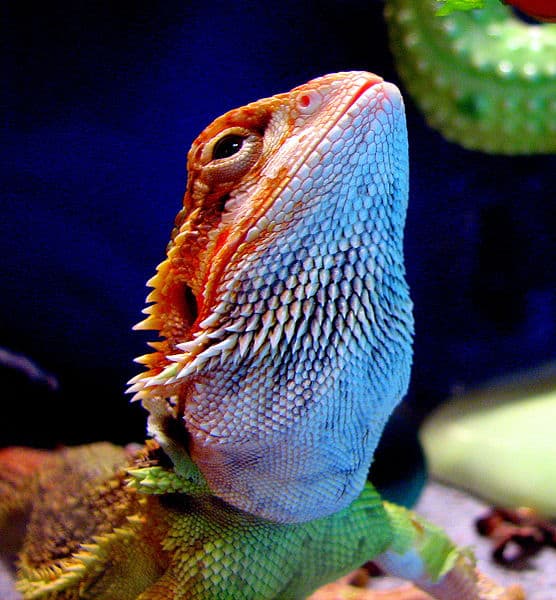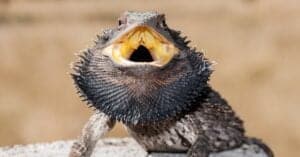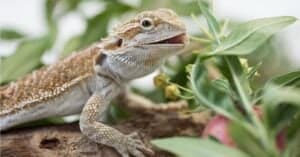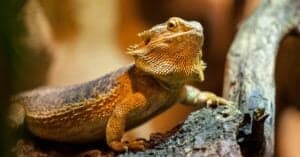If you notice your bearded dragon closing its eyes, you might assume it’s just a bit sleepy. After all, bathing in a heat lamp and gobbling down pinkies and kale all day is tiring. There’s some truth in this, as bearded dragons close their eyes when they sleep, like most animals.
However, though there’s no reason to become worried, there are a handful of reasons bearded dragons close their eyes, and most are not good ones. One of the reasons is not alarming but may be a little upsetting to some who like showing their pets affection.
If this is your first time taking care of a bearded dragon or three, knowing the reasons behind closing their eyes is a good idea. It will help you get a grasp on what they need and when to investigate potential problems or dangers.
1. Shedding is Catching On the Bearded Dragon’s Eyes
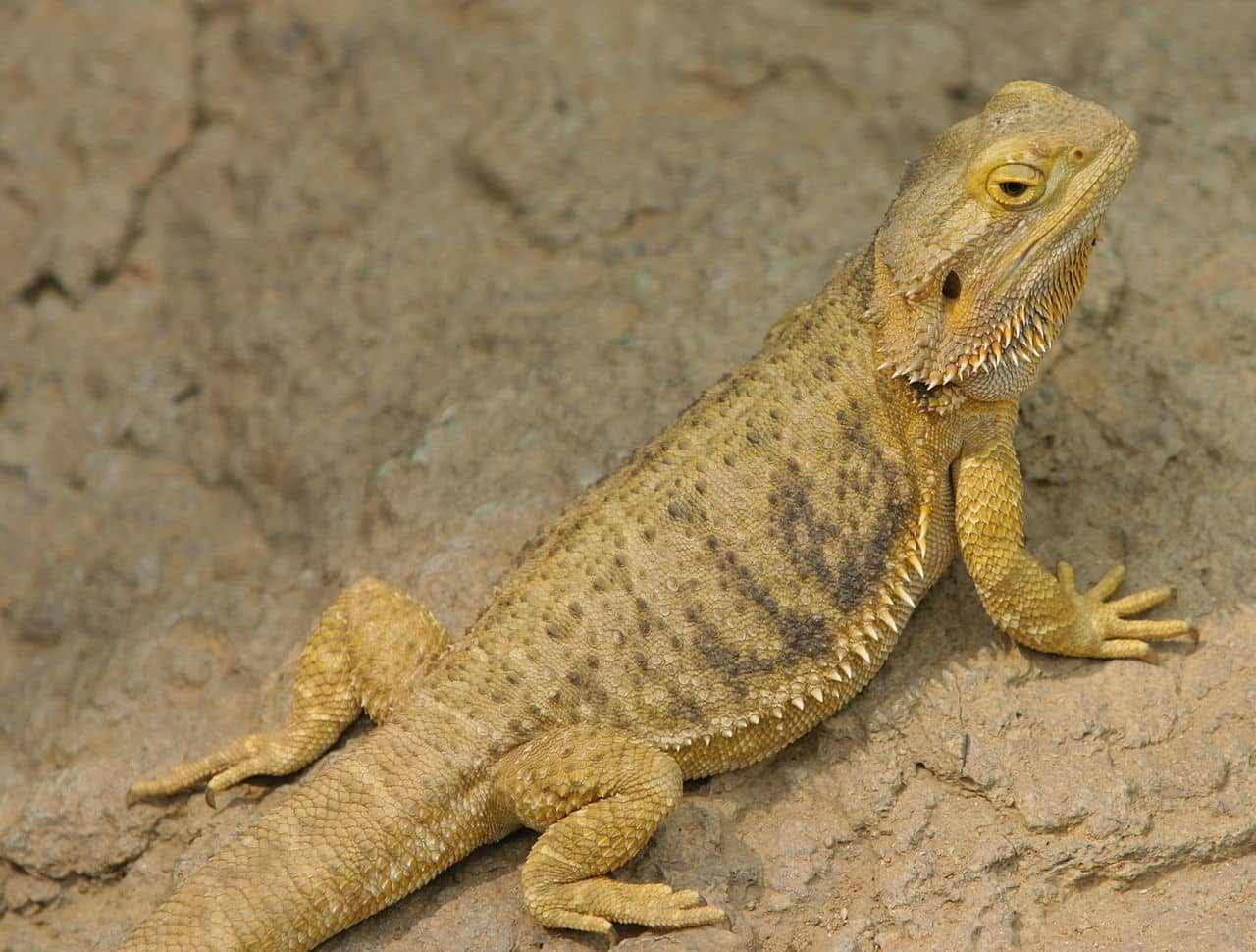
©Cburnett, CC BY-SA 3.0, via Wikimedia Commons – License
Bearded dragons shed their skin periodically. It’s nothing more than a sign they are fed well and growing. It may not be the prettiest thing in the world, but it’s a completely natural and normal process.
Most of the time, the skin-shedding phase comes and goes like normal. However, if you know it’s shedding its skin and your bearded dragon is closing its eyes often or permanently, it’s time for a closer evaluation. Once in a blue moon, the shedding process may force the dead skin over the eye, creating an irritation or forcing the eye to close.
Never peel away the shedding skin to relieve the dragon’s eye. The solution comes first, then you can take the time to consider what caused it in the first place. First, run a warm bath, or shallow bath and place your bearded dragon into it. Allow it to move around and let the moisture rectify the problem.
As a last resort, use a toothbrush with soft bristles or a Q-tip to gently rub the shedding skin away from the eye. Attempting to peel it may hurt the bearded dragon, so avoid doing so.
2. Your Bearded Dragon is Dehydrated
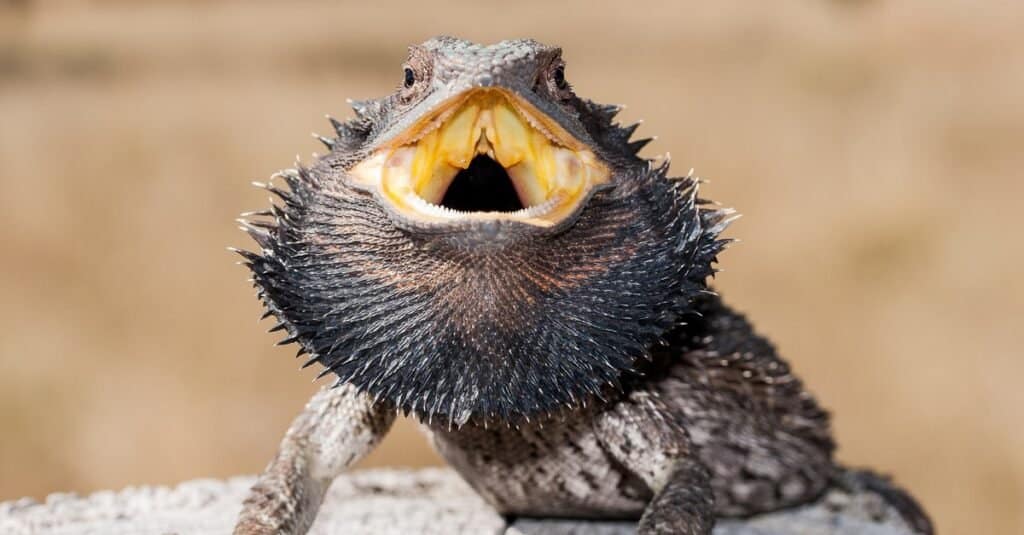
©Ken Griffiths/Shutterstock.com
This is where paying close attention and learning the behaviors and habits of your bearded dragon come in handy. If it’s licking its lips a lot, has gooey saliva, or is far less active than usual all of a sudden, one of these could be the reason your bearded dragon is closing its eyes a lot.
Bearded dragons often need a more unique source of water than the traditional pet bowl, like you would provide for a dog or cat. One good way to make sure they are getting plenty of water is to sprinkle or spray water on a dish full of kale, whenever it’s feeding time.
You can also use a water garden dispenser, which is a unique way of providing your bearded dragon with some veggies along with plenty of water. Regardless of what you choose, bearded dragons will often ignore a standard dish full of water in their tank.
3. Your Bearded Dragon Has Something in its Eye
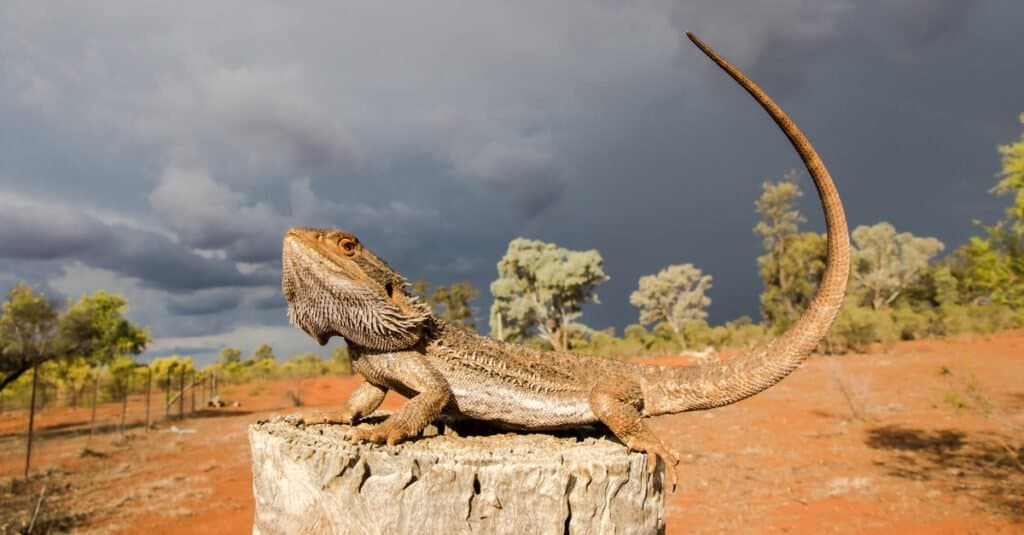
©Ken Griffiths/Shutterstock.com
With us, it’s a simple matter of opening our eyes under running water or rubbing it out when something gets caught in there. Of course, that doesn’t always work, but at least we have options that eventually do the trick.
Imagine being a bearded dragon, closing your eyes over and over with no other way to get the dust or debris out of its eye(s). For this, you’ll need reptile drops. Avoid using tap water. While we may think tap water is perfectly fine, it’s far from it.
The only reason tap water doesn’t send us all to the ER regularly is that we’re mostly tolerant of what comes out of the faucet. Reptiles have no such luxury and will likely end up with an eye infection, exacerbating an already aggravating situation.
4. Your Bearded Dragon is Comfy in the Light
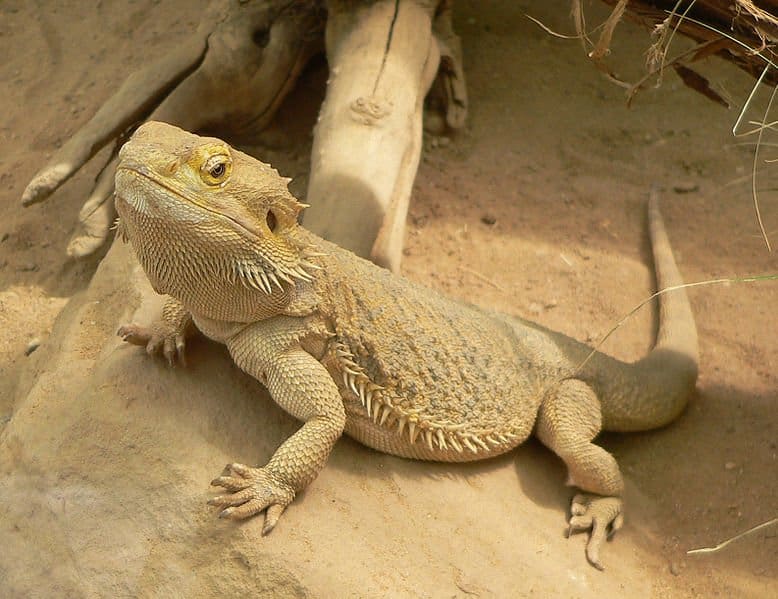
©Frank C. Müller, Baden-Baden, CC BY-SA 2.5, via Wikimedia Commons – License
This is one of the few instances where nothing is wrong, and your bearded dragon is closing its eyes because it’s luxuriating in their heat lamp. If you enjoy taking your bearded dragons outside in the summer, they might do the same thing in the sunlight, especially if they stumble upon a warm rock.
However, in some cases, you may be providing the wrong kind of lighting for your bearded dragon, which will also cause it to close its eyes. UVB 10 to 12 is the best reptile lighting for bearded dragons, and they’ll be perfectly comfortable basking in its warm glow.
The wrong light might not necessarily hurt them, but it could be aggravating enough, in the short term, to cause a lot of slow blinking. In the long term, it’s detrimental to your dragon’s health. Coiled bulbs in small tanks might do irreversible damage to a dragon’s eyes, so be sure to carefully read the instructions on the lamp before you purchase it.
5. Not Enough Humidity
People who live in the north or Midwest are just as capable of owning a bearded dragon as those who live in the south, near the Atlantic or Gulf of Mexico. The thing is, the latter areas are naturally more humid, while the former areas feature a drier climate.
On the other hand, too much humidity holds its dangers and is just as bad for a bearded dragon. The perfect humidity level for dragons is around 35% to 40%. This is simple enough to achieve in places like Florida unless you run the heater pretty hard in the winter.
Most in-home thermostats today are capable of telling you the general humidity levels in your home. If need be, keep a humidifier nearby and use it when the humidity levels drop too low in the house. You can also purchase hydrometers for a terrarium setup on Amazon or your local exotic pet store.
Proper humidity levels will keep your dragon nice and comfortable, while also helping it shed easier when it’s time to do so.
6. Cricket Attacks
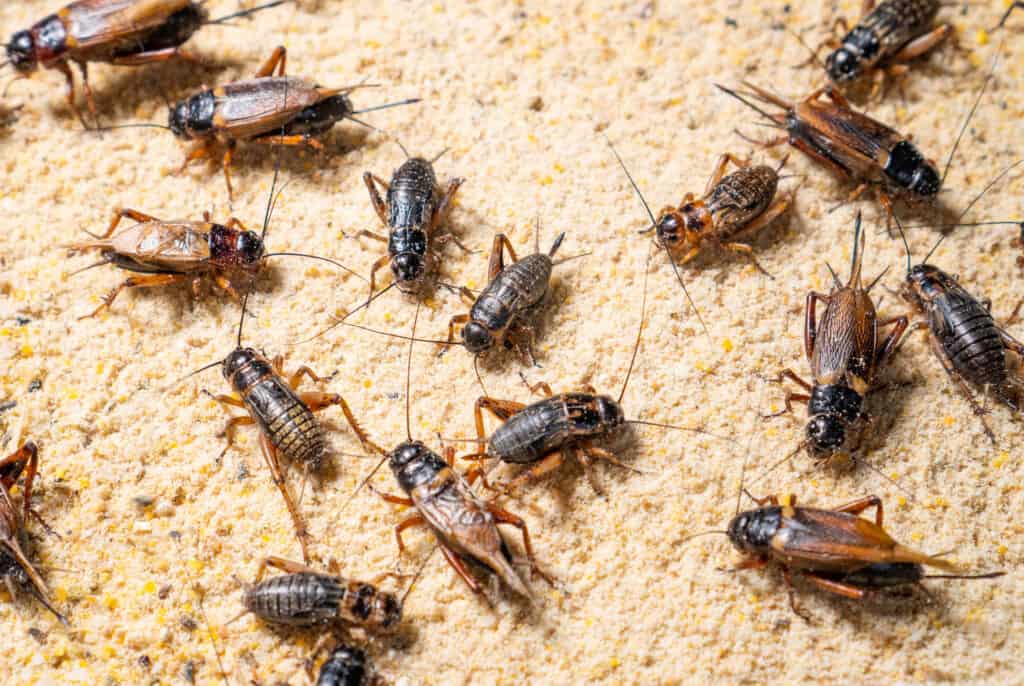
©iStock.com/amnat jomjun
If your bearded dragon doesn’t clear out the crickets you feed it, the remaining ones are potential trouble. Crickets are pretty bold and are known for actively attacking their natural predators. Of course, there’s nothing a cricket could do to a bearded dragon that would impair it permanently.
However, a well-timed cricket attack might damage your bearded dragon’s eyes. Crickets are delicious and natural treats for your bearded dragons, but when they are full, make sure there are no more crickets in the terrarium with your dragon.
7. Vitamin Deficiencies
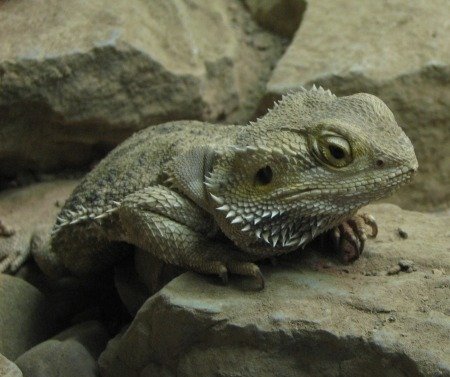
©Ltshears / Public domain, from Wikimedia Commons, the free media repository – License
This is a common problem with brand-new bearded dragon owners who are not used to the little things that maintain the dragon’s health. We learn as we go, but it’s important to sit down and digest as much literature on bearded dragons as you can before making the leap and purchasing one.
Bearded dragons aren’t high maintenance, but they still require a nutritional, often multi-faceted diet, along with plenty of warmth, and a place to sleep that’s not in the light, water, and vitamin A.
Vitamin A is the most essential vitamin in a dragon’s diet. If you notice your bearded dragon closing its eyes frequently and there is no visible reason for it to do so, a vitamin A deficiency is a likely culprit. The good news is that it doesn’t take much to get your dragon back on track.
Fresh kale, carrots, most dark green, leafy vegetables, and even sweet potatoes are bearded dragon favorites and have plenty of vitamin A.
8. Stuffy Nose
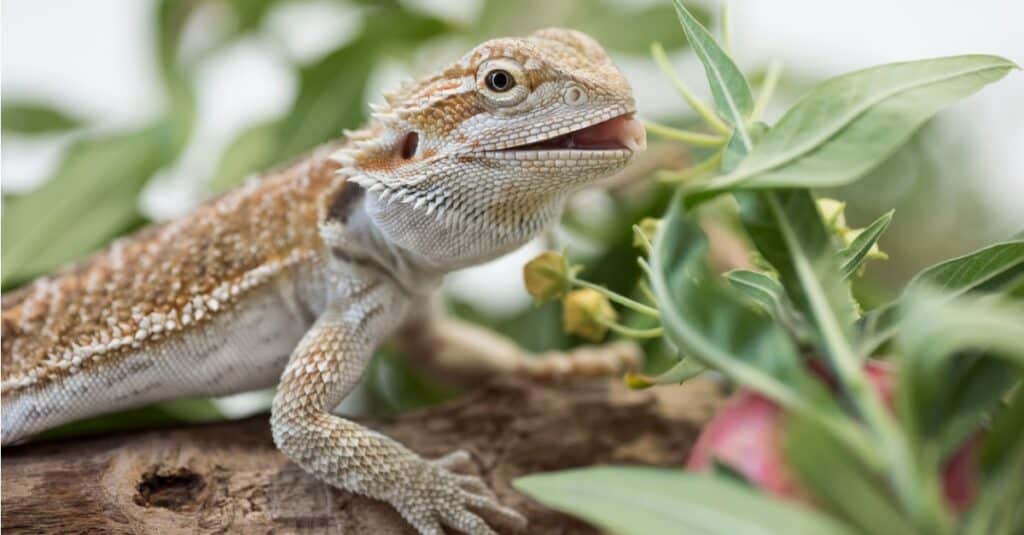
.
©iStock.com/JeannetteKatzir
Yes, even bearded dragons can get a stuffy nose from time to time. There are signs to look for since a bearded dragon is not likely to grab a tissue and blow its nose anytime soon. Swollen or tender areas around the nasal cavities are sure signs of a clogged nose.
The best way to help your dragon is to blast it out. To do this, you can use a bulb or a syringe, filled with water. If you use tap water, make sure it’s boiled sufficiently to remove potential bacteria. Make sure you avoid sharp needles, so you don’t accidentally stab an uncooperative dragon.
They won’t like the next part. Use the syringe or the bulb to spray a pressurized stream of water into each cavity. Keep an eye on your lizard over the next day or so. If the problem doesn’t clear up, it’s time to give your veterinarian a call.
9. Your Bearded Dragon is Sick
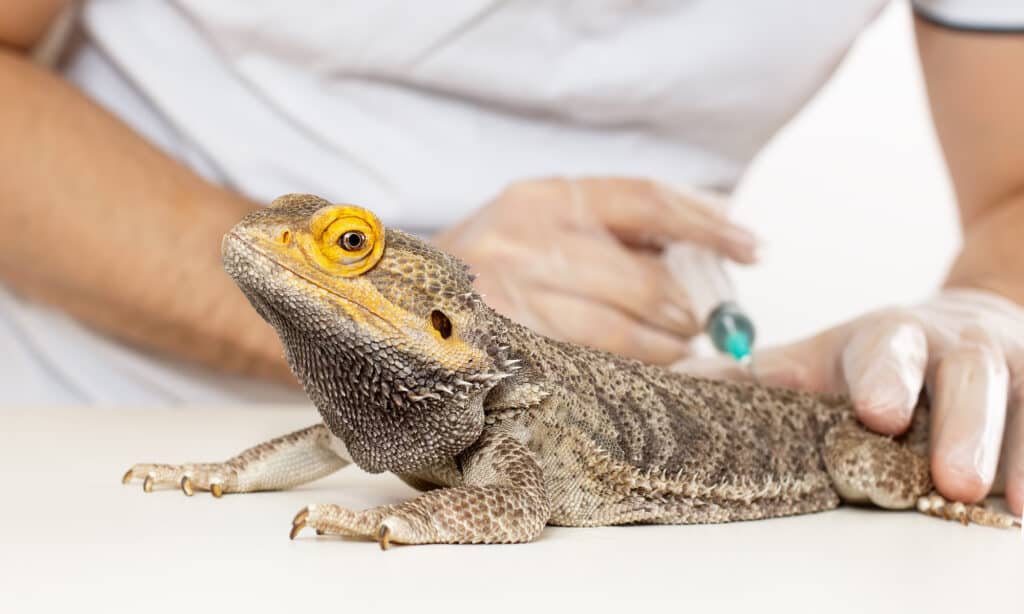
©iStock.com/Kukurund
If sickness is the issue, your bearded dragon closing its eyes won’t be the only outward sign. It will also be lethargic and will probably avoid its regular amount of water and food intake. This is when the investigation of everything is paramount.
Make sure the humidity is between 35% and 40%, you’re using the right UVB 10 to UVB 12 lights, and you’re feeding it a solid diet with vitamin A and the occasional proteins. Your dragon should also be getting rest, away from the light, and have plenty of room inside the terrarium.
A single bearded dragon should have 30+ gallons of terrarium space all to itself. Double that number for two, and so on. There are several diseases and complications that bearded dragon owners should be aware of, along with the symptoms.
10. Mites
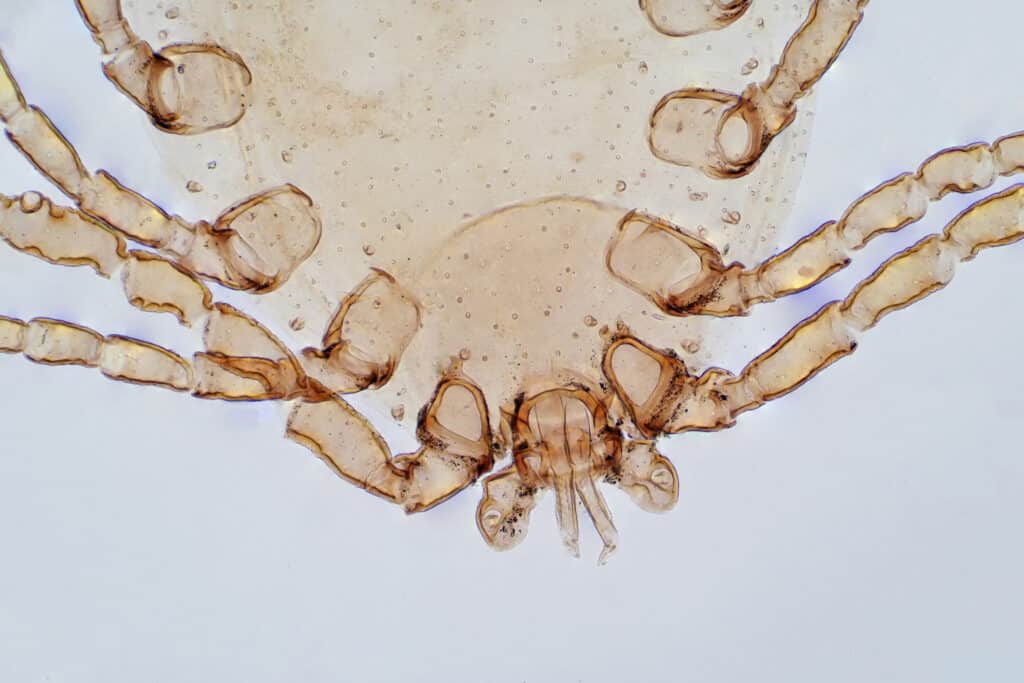
©iStock.com/tonaquatic
Mites are a real pain, mostly because they are so tiny that they are often very difficult to see. They don’t jump around and go crazy like fleas, and they’re much smaller than either fleas or drain flies.
If you have a problem with mites on your bearded dragon, odds are good that mites are elsewhere in the house as well, especially if you handle your bearded dragons with frequency. Unless you have very good close sight, you won’t see the mites, though you’ll feel them.
The best way to get rid of them is to clean your bearded dragon in a warm bath. While it’s playing around in the water, you or someone else can thoroughly clean the terrarium. It’s best to do this outdoors to limit the number of mites potentially escaping into the house.
Summary of Common Reasons Your Bearded Dragon is Closing Its Eyes
| # | Common Reasons |
|---|---|
| 1 | Issues with shedding |
| 2 | Dehydration |
| 3 | Something in its eye(s) |
| 4 | Enjoying the heat lamp |
| 5 | Low or high Humidity |
| 6 | Cricket attacks |
| 7 | Vitamin A deficiency |
| 8 | Stuffy nose |
| 9 | Bearded dragon is sick |
| 10 | Mites |
Final Thoughts
As you can see, there are several reasons your bearded dragon is closing its eyes, and most of them are not good ones. Hopefully, yours is just enjoying the warmth of your artificial sunlight.
It pays to pay attention to your bearded dragon’s habits and to take the time to research their needs. There’s always something new to learn about these fun reptiles, and most of it is pretty good stuff. However, this is a case of, “what you don’t know can hurt your pet.”
The photo featured at the top of this post is © Claudia Nass/iStock via Getty Images
Thank you for reading! Have some feedback for us? Contact the AZ Animals editorial team.



